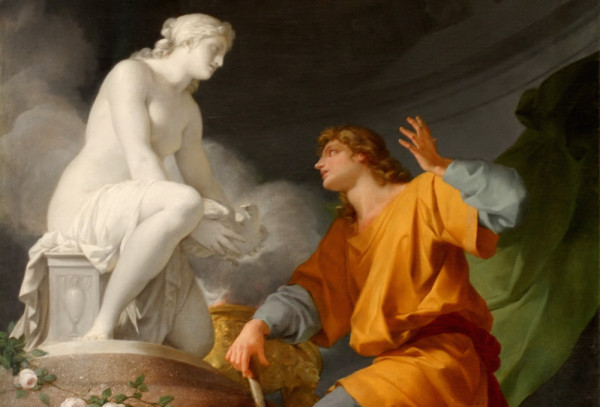
This epic poem from the Roman bard published in 8 A.D. outlines the “history” of the world through 250 transfomative-themed myths over 15 books. Sexual desire was traditionally described in ancient Rome as a burning flame (not much changes over 2 millennia), so Metamorphoses has a lot of hot imagery. But it’s not all positive. Like a provocative, male-centric, Hollywood movie, it’s got the good, the bad, and the ugly:
Objectification
He looks at Daphne’s hair
as, unadorned, it hangs from her fair neck,
and says: “Just think, if she should comb her locks!”
He sees her lips and never tires of them;
her fingers, hands, and wrists are unsurpassed;
her arms — more than half-bare – cannot be matched;
whatever he can’t see he can imagine;
he conjures it as even more inviting.
Longing
When Echo saw
Narcissus roaming through the lonely fields,
she was inflamed with love, and — furtively —
she followed in his footsteps. As she drew
still closer, closer, so her longing grew
more keen, more hot — as sulphur, quick to burn,
smeared round a torch’s top bursts into flame
when there are other fires close to it.
Rape & Racism
The sight was quite enough; the flame of love
had taken Tereus, as if one had set
afire ripe grain, dry leaves, or a haystack.
It’s true she’s fair, but he is also spurred
by venery, an inborn tribal urge.
The vice inflaming him is both his own
and that dark fire which burns in Thracian souls.
His impulse was to buy his way with her,
to bribe her closest friends or faithful nurse
and then, when he’d corrupted them, to tempt
the girl himself, though that might cost his kingdom;
or else to ravish her, and then defend
his rape by waging unrelenting war.
Homosexuality & Transgenderism
(Iphis — raised as a boy, in love with & betrothed to another woman, Ianthe — thinks to herself):
“Even now there’s no
desire of mine that’s been denied; the gods
have been benevolent — they’ve given me
as much as they could give; and what I want
is what my father and Ianthe want,
and what my future father-in-law wants.
It’s nature, with more power than all of these,
that does not want it: my sole enemy
is nature! Now the longed-for moment nears,
my wedding day is close at hand: Ianthe
will soon be mine — but won’t belong to me.”
(Later the gods turn her into a man.)
Objectophilia
[Pygmalion] is enchanted and, within his heart,
the likeness of a body now ignites
a flame. He often lifts his hand to try
his work, to see if it indeed is flesh
or ivory; he still will not admit
it is but ivory. He kisses it:
it seems to him that, in return, he’s kissed.
He speaks to it, embraces it; at each
caress, the image seems to yield beneath
his fingers: and he is afraid he’ll leave
some sign, some bruise.
Incest
This was the time when women, for nine nights,
shun union with their husbands; any touch
of man is banned. Cenchreis, the king’s wife,
has joined the throng; she shares these secret rites.
When, in her wretched zeal, the old nurse finds
that Cinyras is drunk with wine, deprived,
without his lawful wife, she tells the king
that a young girl is now in love with him;
but she does not reveal the girl’s true name –
the girl whose beauty she is quick to praise.
And when he wants to know the young girl’s age,
she says, ‘the same as Myrrha’s.’ When he tells
the nurse to fetch that girl, she runs to find
her Myrrha and, ‘My dear, we’ve won,’ she cries”
Mean-Spirited Love Spells
(Venus, in Orpheus’s song):
“I saw that I would have
to make them serve as an example: I
incited my own self against that pair.
One day, they chanced to pass before the shrine
that, to fulfill a vow that he had pledged,
Echion built: a temple for Cybele,
the Mother of the gods, a shrine that stood
concealed within the shadows of deep woods.
The pair had journeyed long; they needed rest;
and I ignited him: Hippomenes –
such is my power as a deity –
was struck with an indecent, sudden need
for Atalanta’s body.”
Big Dicks
(Large members=good luck=bad luck for theives):
Pomona feared the peasants’ brutish ways,
fenced off her orchards, and avoided men –
she never let them in.
How hard they tried –
young Satyrs, with their dancing, leaping steps
and Paris, whose horns were garlanded with pines;
and he whose years were more than what he showed,
Silvanus; and Priapus, he whose scythes
and penis are a sight that terrifies
all thieves – they tried, but they did not succeed.
Sneaky Seduction
(Vertumnus, disguised as an old woman, trying to persuade Pamona to get with Vertumnus):
“And, too, your tastes show similarities:
you tend your fruit with love, but is not he
the first to welcome what you offer – glad
to hold in his right hand your gifts of fruit?
But now he is not bent on what your trees
may bear; nor does he care for garden herbs,
however sweet the juice: what he pursues
is you alone – and nothing else will do.
Have mercy, he is burning; act as if
the plea that you are hearing from my lips
had come from his own self.”
















